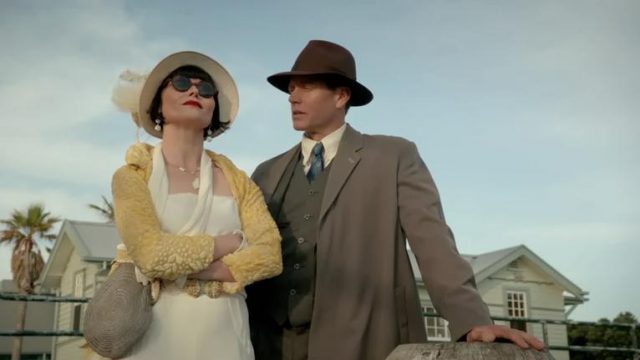I have watched a lot of detective shows. Not exactly news—I’ve already written about something inspired by Miss Fisher Mysteries once this month. But in addition, I’ve watched all of Doctor Blake and am plowing through Death in Paradise. I’ve watched some of Father Brown, and if the good Lord Peter Wimseys were streaming on Netflix or Amazon, I’d watch that, too. I’ve watched a fair amount of Poirot over the years, though Miss Marple doesn’t appeal, particularly; I think the main reason I watch Poirot is that I like David Suchet. I’ve watched Brother Cadfael. Actually, I used to watch Mystery! a lot with my mom, Sunday afternoons of my childhood, though she always liked Sherlock Holmes more than I.
My mother, I think, just generically likes mysteries. (It’s something she has in common with Graham, though I don’t think she knows that.) She did watch every Sunday, which I did not. I still remember how avidly she watched the Jeremy Brett Holmes with my older sister. My interest is more erratic; I think I’m a dilettante in my interest in mysteries, as I am in any number of other subjects. (Gaming, anime, science fiction, etc.) For me, the detective matters, which is why I can’t get into Sherlock Holmes. I don’t like him, so I’m not interested in the mystery.
I’m a little alarmed at how many detectives I watch who are tormented by a murder in their childhood. I wasn’t surprised when Doctor Blake discovered that his mother had been murdered; of course she had. Like Miss Fisher’s sister and Jordan Cavanaugh’s mother and Adrian Monk’s wife and sodding Thomas and Martha Wayne. And if it’s not a murder, it’s some other sort of tragic death, like the car accident that killed Kinsey Millhone’s parents (though there’s no adaptation of those books) or the entire town of Cabot Cove or World War I or something. It’s almost as though the only detectives I love without a tragic backstory are Columbo and Encyclopedia Brown.
There’s always got to be something interesting about the detective, it seems. Jonathan Creek creates illusions for a stage magician. Nick Charles married into money, and Nora’s an heiress. Lord Peter’s a lord, son of a duke. Remington Steele doesn’t exist. If I remember correctly, Miss Marple’s just an ordinary little old lady; even Jessica Fletcher writes mysteries! And of course there are probably enough people in one holy order or another of whatever denomination to populate the Holy See. Enough cops and private detectives to run law enforcement for a major metropolitan area.
Even a lot of those cops are quirky in some way. Miss Fisher is rich and eccentric—she grew up poor and only has money and a title because of the war, and she’s a suffragist who can fly an airplane and has lots of sex and is willing to try just about anything once. The various policemen of Death in Paradise have been relocated to a small Caribbean island that’s a lot more French than they are. (I’m given to understand the geopolitics are nonsense, but never mind.) Even Lenny Briscoe is Lenny Briscoe-y.
Maybe we’re afraid that, all too often, what stands between us and being murdered in our beds is not Sherlock Holmes but Inspector Lestrade (though Lestrade tends to be much less competent in adaptations than he was in the books), not Sleeping Kogoro but Wide-Awake Kogoro. We like to think that the forces of justice are more Nero Wolfe than Inspector Cramer—and that, crucially, criminals know that. After all, Lord Peter Wimsey once told Harriet Vane that detective fiction is the most moral kind of fiction there is. In detective fiction, justice is always done.
I’m like a lot of these characters—just a working stiff. Be just and support my Patreon!

